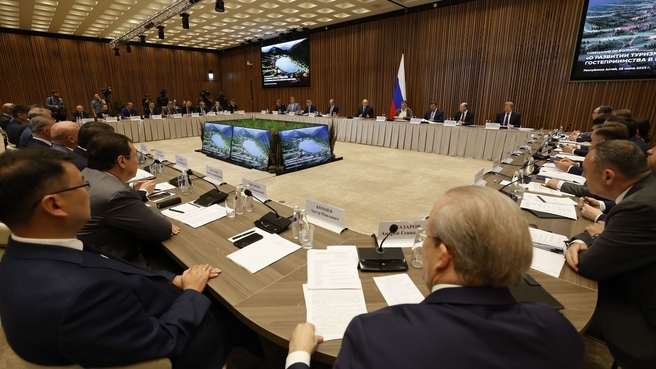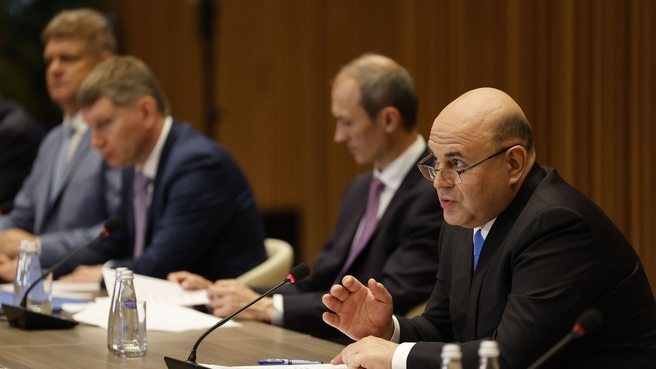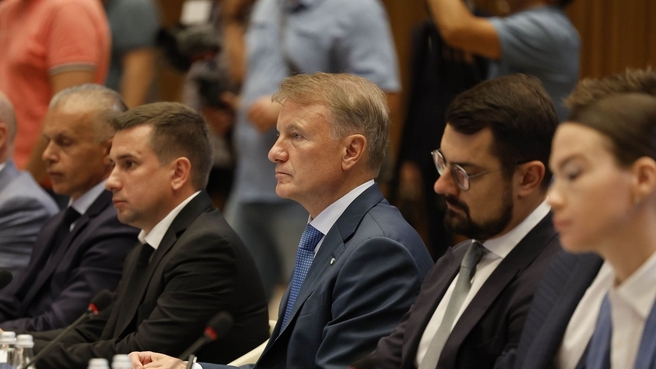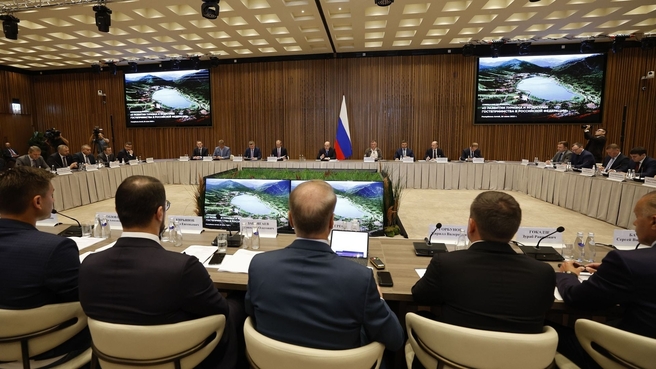The meeting took place during Mikhail Mishustin’s trip to Altai.
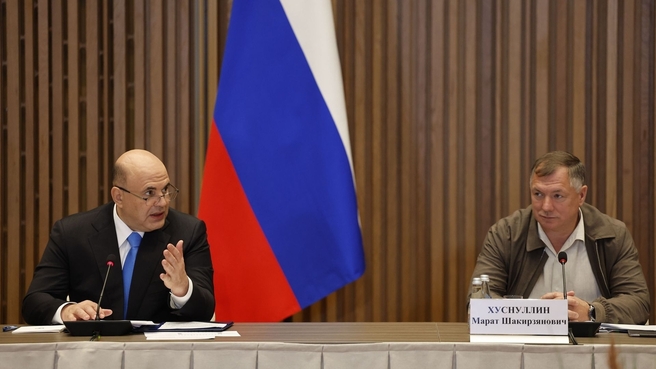
Meeting on developing the tourism and hospitality industry in the Russian Federation. Right: Deputy Prime Minister Marat Khusnullin
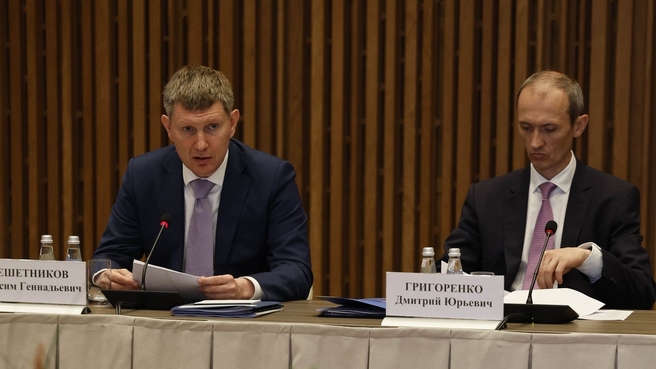
Meeting on developing the tourism and hospitality industry in the Russian Federation. Minister of Economic Development Maxim Reshetnikov and Deputy Prime Minister/Chief of the Government Staff Dmitry Grigorenko
Meeting on developing the tourism and hospitality industry in Russia
Mikhail Mishustin’s opening remarks:
Good afternoon, friends.
The summer vacation season is now underway. Like last year, we will discuss the situation in the tourism industry here, in the Republic of Altai, one of the most important tourist destinations. Experts, representatives from the business community and from the regions, as well as some travelers with whom we have spoken today are with us.
At the meeting on the development of tourism in Derbent a month ago, the President said that a common goal of state and domestic companies should be to ensure the quality of tourist services and create a corresponding infrastructure. It is necessary to plan based on the needs of people with different incomes (incidentally, we have discussed this in detail today). Everyone should have an opportunity to travel, take a break and enjoy all the services offered by modern health resorts and spas.
I would like to emphasise safety. Just yesterday, a truck with tourists overturned in Altai. A tragedy occurred here. I would like to express my most sincere condolences to the family and friends of the victim, and, of course, wish early recovery to the injured. According to preliminary information, unfortunately, this transport vehicle was out of order. The organisers of the excursion had no license to transport people. We often complain about excessive pressure and introduce moratoriums, but there are things that everyone should consider. And, of course, everything that concerns the life and safety of people should be under special control.
Colleagues, I would like to repeat that the federal and regional authorities need to pay serious attention to the quality of tourist services in the regions. It would be good to cooperate with businesses in searching for ways of minimising a repeat of such cases and to analyse each situation separately. Naturally, this concerns not only the Republic of Altai but all of Russia’s regions. Let me say it again – we must focus on the safety and health of the public.
Now I will say a few words about the general situation in the tourism industry. Before this meeting, we looked at many projects all over the country. They included already functioning resorts as well as several business initiatives that we have yet to implement. There are plenty of ideas. I am sure they will interest people, promote the flow of investment into the regions and help increase the number of jobs. I will say it separately – it is very important to create holiday destinations with the potential for development. It is necessary to ensure that people that come here have many alternatives for their families and friends that offer local sightseeing, opportunities for self-improvement, study of science and learning of new subjects, and the historical roots of these places.
In general, domestic tourism is on the rise. Of course, external factors are playing a role, but it is very important to add that travel within Russia is becoming increasingly attractive. I am hearing this myself from friends, acquaintances and colleagues in the office.
There are more opportunities to see our unique nature and world famous architectural and historical landmarks, visit theatres and museums and in general collect new impressions. This is so because everyone likes to travel around the country. We must make it possible, and most importantly, comfortable and safe.
Now routes to the most picturesque corners and important cultural sites are being developed. A lot is being done to improve conditions at beach, health-spa and active recreation destinations, including for children and youth tourism, and this is very important.
Here, of course, we must take a comprehensive approach to the development of the entire tourism industry in order to bring the quality of service to a fundamentally new level, taking into account the potential demand that people have for it. It is also necessary to improve transport accessibility and modernise the hotels.
The government, together with the regions, is gradually addressing these tasks step by step. First of all, we are working under the national project Tourism and Hospitality Industry, which has been in place for about three years. Over 100 billion roubles have been allocated for implementation over the past two years and, of course, we have also provided funds for this year.
In general, I want to say that funding for the industry has significantly increased. We see real returns on these investments. One of the main issues for the tourism industry has always been the availability of convenient and comfortable accommodations, and now we have about 30,000 of them. More than a million rooms are available, of which about 800,000 are categorised. And people, when deciding where to stay, more often prefer hotels, health resorts, recreation centres and campsites rather than private housing.
The demand for them is growing. And we have launched a corresponding programme to build modular hotels, which are gaining significant popularity. Last year, these were built in 20 regions with participation from the federal centre. Most were built in the Leningrad and Moscow regions, as well as the Krasnodar and Altai territories; but throughout country, there are already over 400 such facilities. According to some estimates, the market for these facilities will grow by about one-third within three years. This construction will continue. The President instructed us to increase funding for the creation of modular structures by 11 billion roubles in the next two years.
Of course, when we talk about recreation, private companies play an important role. Today, when we toured the exhibition, I thanked every investor. This is very important. We will continue to support Russian businesses in creating, which is also very important, competitive products and services for our citizens, first of all, via special loan terms, such as for building hotels. Right now, 87 projects with the total of 25,000 rooms are being built.
At the President’s initiative, we are considering the possibility of expanding this programme with an emphasis on three-star and four-star hotels.
In line with the President’s instructions, we are drafting resolutions to help businesspeople create year-round amusement and aqua parks and develop the infrastructure of ski resorts. This will make it possible to launch large investment projects and – something very important to people – create powerful centres of attraction. Travellers badly need anchor resorts like this.
Suspending VAT on the sale of vouchers in Russia will help the industry. We made this decision. The Government drafted amendments to the legislation and the State Duma adopted them last week. Hotels, campgrounds and recreation centres are already exempt from this tax while companies can apply for reimbursement for funds spent, and use the capital to create new tourist products and improve services.
I would like to say a few words about another important aspect of this – making tourism more accessible to people, especially children and young people.
Last year we launched the popular programme for school trips and transferred half a billion roubles for this purpose. It will allow 100,000 pupils in the 5th-9th forms to travel and learn about the history of their homeland and go on excursions. Imagine how important this is for our children and students. This year, we doubled the funding for this to 1 billion roubles.
This year, we allocated 3 billion roubles for the development of youth tourism under the More Than a Trip programme. These funds will make it possible to organise trips in Russia for the finalists and winners of academic competitions and contests, including representatives of volunteer movements and the authors of the creative initiatives on the Russia, Land of Opportunity platform. Meanwhile, students, budding scientists and postgraduates are given an opportunity to travel and take part in general education and scientific programmes under the Student Tourism project. Over 400 tourist products have been created for them. During their travel, they can stop at both campuses and hostels.
I think we should have more programmes like this. They help people truly learn about Russia, primarily becoming familiar with our traditions and the history of our regions, and discover their homeland for themselves.
Colleagues,
We have many great places in Russia. Large cities and famous resorts are traditional centres of attraction. This applies to Moscow, St Petersburg, the Krasnodar Territory, the Kaliningrad Region, the Primorye Territory, and Kamchatka.
Unfortunately, Crimea is in a difficult situation now. In line with the President’s instructions, we provided additional support for the peninsula’s tourist industry. We allocated 2.7 billion rubles this year to allow companies to make lump sum payments to their employees to keep them employed and continue their business. This measure will cover over 3,500 companies.
Importantly, more and more Russian regions are opening for tourism. There is an increasing demand for trips to the Caucasus, especially Dagestan, and recreation on the Caspian coast. The same is true of Altai. Last year, Altai ranked among ten top popular destinations.
Over 2.5 million people visited the Republic of Altai. Tourism at Lake Baikal is also on the rise in all seasons. Over a million people visit Lake Baikal in the Republic of Buryatia – I just flew back from there yesterday, and there are about 2 million visits to the Irkutsk Region.
We must continue working on the development of the domestic tourist industry to let people travel comfortably and with pleasure in their own homeland.
Let us discuss it.
